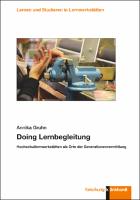Doing Lernbegleitung
Hochschullernwerkstätten als Orte der Generationenvermittlung
Abstract
The study “Doing Lernbegleitung. Hochschullernwerkstätten als Orte der Generationenvermittlung”
addresses the so-called first phase of teacher training at German universities. Based on
an examination of the special features of the research field of university learning workshops, the
study explores the question of how teacher trainees are confronted with the pedagogical concepts
of individualization as well as open and informal education. It focuses the introduction to
a specific professional understanding of teachers as learning companions within the framework
of the practical project “Werkstatt für Kinder” of the university learning workshop OASE at
the University of Siegen: Thus, the implementation of the conceptual self-understanding in the
social practice will be focused on. In order to ethnographically explore learning companionship
as a specific bundle of social practices, both the preparation for the “Werkstatt für Kinder”
within the student peer group and the social construction of students as learning companions
for children will be examined. This approach allows to successively describe typical challenges of
both students and children as well as the associated specific fields of tension and conflicts of the
pedagogical setting of the university learning workshop from an empirically based perspective.
The study is characterized by a very personal approach to the field and thus an involved
researcher position, which is used as an analytical tool in the research process. The empirical
results are presented according to the unfolding of social practice in the field and then linked to
two theoretical frameworks, generational order as well as (pedagogical) spaces and things. Thus,
learning companionship is reconstructed as a bundle of specific social practices situated in the
OASE university learning workshop, which can be explored and described as the production
of generational order embracing the triad of human actors, spaces and things. This theoretical
and analytical perspective challenges the normative understanding contrasting “traditional”
and “alternative” pedagogic concepts (for example differences between teaching and learning
companionship or between children and students) by describing differences as an effect and
medium of social practice. Die Studie „Doing Lernbegleitung. Hochschullernwerkstätten als Orte der Generationenvermittlung“
wendet sich dem Bereich der sogenannten ersten Phase der Lehrer*innenbildung an
deutschen Hochschulen zu. Ausgehend von einer Auseinandersetzung mit den Besonderheiten
des Forschungsfelds Hochschullernwerkstatt geht die Studie der Frage nach, wie Studierende
des Lehramts im Rahmen des Praxisprojekts „Werkstatt für Kinder“ der Hochschullernwerkstatt
OASE an der Universität Siegen mit dem pädagogischen Konzept der Individualisierung
bzw. Öffnung und der damit verbundenen Einführung in die Rolle der Lernbegleitung
konfrontiert werden: So wird die Umsetzung des konzeptionellen Selbstverständnisses in der
sozialen Praxis der OASE Hochschullernwerkstatt fokussiert. Um ethnografisch zu erforschen,
wie Lernbegleitung gemacht wird, wird sowohl die Vorbereitung auf die „Werkstatt für Kinder“
innerhalb der studentischen Peer-Gruppe, als auch die Inszenierung von Studierenden als
Lernbegleiter*innen für Kinder in den Blick genommen. Durch diesen Zugang können typische
Handlungsprobleme aller genannten Akteur*innen und damit verbundene spezifische Spannungsfelder
und Konflikte des pädagogischen Settings Hochschullernwerkstatt sukzessive aus
einer empirisch begründeten distanziert-analytischen Perspektive heraus beschrieben werden.
Die Studie ist von einem sehr persönlichen Zugang zum Feld und damit einer involvierten
Forscherinnenposition geprägt, die im Rahmen des Forschungsprozesses als Analysewerkzeug
genutzt wird. Die empirischen Ergebnisse werden entsprechend der Entfaltung sozialer
Praxis im Feld vorgestellt und anschließend an zwei theoretische Rahmungen, generationale
Ordnung und (pädagogische) Räume und Dinge, angebunden. So wird Lernbegleitung als eine
spezifische, in der OASE Hochschullernwerkstatt situierte, soziale Praxis rekonstruiert, welche
als Herstellung generationaler Ordnung durch die Trias von menschlichen Akteur*innen,
Räumen und Dingen beobachtet und beschrieben werden kann. Im Gegensatz zu der normativ
aufgeladenen Gegenüberstellung von „traditionellem“ und „alternativem“ pädagogischen Handeln
werden mittels dieser theoretischen und analytischen Brille Unterschiede (zum Beispiel
zwischen Lehren und Lernbegleitung, aber insbesondere auch zwischen Kindern und Studierenden)
nicht als bereits gegeben vorausgesetzt, sondern prozesshaft als Effekt und Medium
sozialer Praxis aufgefasst.
Keywords
Lernbegleitung; Hochschule; Ethnografie; Peer Group; Student; Lernwerkstatt; Pädagogische Praxis; Peer-Beziehungen; Lehrerausbildung; Lehrerbildung; Lehramtsstudent; Generation; Pädagogisches Handeln; Lernort; Lernen; Lernumgebung; Individualisierung; Lehrerrolle; Generationenbeziehung; Schüler-Lehrer-Beziehung; Empirische Forschung; Studie; Projekt; Beobachtung; Deutschland; Higher education institute; Ethnography; Peer groups; Male student; Learning workshop; Peer relationship; Teacher education; Teacher training; Teachers' training; Student teachers; Educational setting; Learning; Educational Environment; Learning environment; Individualization; Teacher role; Teacher's role; Generation relationship; Pupil-teacher relation; Pupil-teacher relationship; Empirical research; Project; Projects (Learning Activities); Observation; Germany; ChildDOI
10.35468/5926ISBN
9783781524873, 9783781559264Publisher
Verlag Julius KlinkhardtPublication date and place
Bad Heilbrunn, 2021Series
Lernen und Studieren in Lernwerkstätten,Classification
Higher education, tertiary education


 Download
Download Web Shop
Web Shop